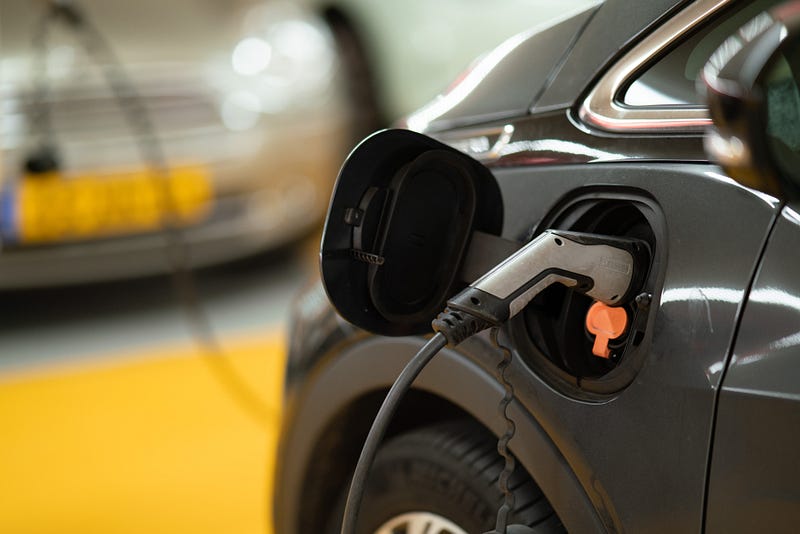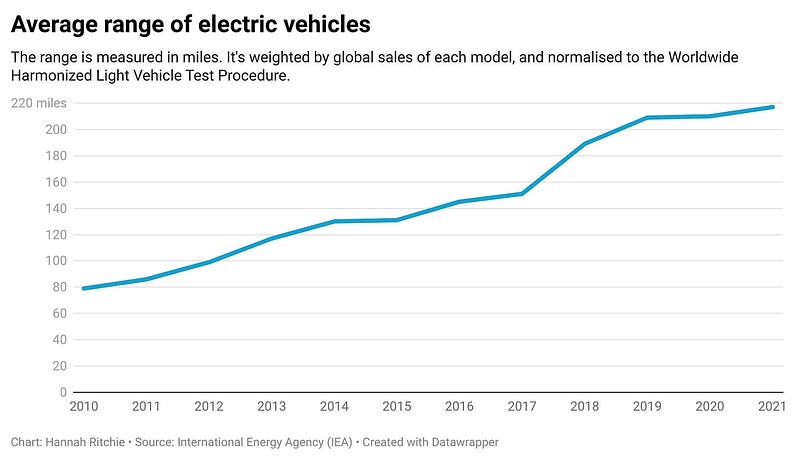Navigating the Range Anxiety Landscape in an Electric Future
Written on
Chapter 1: Understanding Range Anxiety
As we transition to an electrified world, the reliability of batteries is becoming an increasingly critical concern.

Photo by Michael Fousert on Unsplash
Not long ago, my six-year-old MacBook Pro was struggling to keep up. One of the key indicators of its impending failure was its dwindling battery life, which barely lasted two hours after a full charge. I had replaced the battery just two years prior, and it was already showing signs of weakness.
In an attempt to make the best of the situation, I utilized my laptop's limited battery as a productivity timer. As I shared in a previous article, knowing I only had two hours motivated me to focus intensely and eliminate procrastination.
However, this approach had its limits. The stark reality was that a laptop with such a short battery life severely restricted my ability to work outside my home. I typically enjoy writing in cafes, where the energy of those around me both calms and energizes me. Yet, with my MacBook’s abysmal battery performance, venturing out felt less worthwhile. It often took me an hour just to get into the right mindset for writing, and by the time I was in the groove, I would be left with only an hour to work. This led to me opting to stay home, consumed by the anxiety of being unable to focus in public—an ironic twist of "meta-worry."
Ultimately, a few weeks ago, the motherboard failed entirely, rendering the device unusable. I decided it was time for a new MacBook Pro, which arrived last week. I have to say, the new models are impressive, featuring excellent keyboards, stunning displays, and trackpads that are astonishingly large.
What has truly transformed my work habits, however, is the incredible battery life. I’ve been able to work unplugged in a cafe for eight consecutive hours—enjoying breakfast and lunch while still having 45% battery remaining. I’m baffled by how Apple has achieved such remarkable performance, but it has completely changed my work routine. I can now roam the neighborhood, write in the library, enjoy the fresh autumn air on a park bench, or even settle at a nearby bar for a drink while I write. It’s a delightful experience.
This led me to a significant realization: my previous laptop had instilled in me a form of "range anxiety."
Range anxiety is a commonly used term in the electric vehicle (EV) realm, describing the persistent worry about whether your battery will last long enough to reach your destination. This anxiety can create a sense of vulnerability that complicates daily life. It's a concern so prevalent that a survey by the Canadian Automobile Association revealed that 67% of electric vehicle owners worry about running out of charge.
If range anxiety is so pronounced among current electric car owners, it’s even more pronounced for those who haven’t yet made the switch. Many potential EV drivers are likely to fear that they would constantly be checking their battery status and altering their routines to accommodate its limitations.
Reflecting on my laptop's decline, I realized that this anxiety isn't exclusive to electric vehicles. As we increasingly adopt renewable energy sources in various aspects of our lives—such as heating, lighting, and powering our workplaces—we are likely to encounter this anxiety more frequently.
This concern often arises regarding solar and wind energy, where critics argue that these sources are inconsistent and our energy storage systems are not yet robust enough to handle these fluctuations. While the concerns regarding intermittency are valid, experts, including Saul Griffith in his book "Electrify," argue that the variability of solar and wind energy can actually complement each other effectively at scale. With advancements in battery technology and long-distance power transmission, we can address these engineering challenges.
However, navigating the emotional hurdles—this sense of vulnerability, whether real or imagined—will also be crucial during this transition. As we move towards a more electrified world, we may indeed find ourselves in a "range anxiety society." While I believe we can eventually overcome these challenges, we must first endure the journey.
Interestingly, data from the CAA survey I mentioned indicates that the transition may not be as daunting as it seems. After purchasing an electric vehicle, the percentage of owners concerned about range anxiety dropped from 67% to just 30%.
This shift makes sense: most electric vehicles released in the last five years can travel between 180 to 200 miles on a single charge, while the average American driver covers only 37 miles daily. Therefore, many EV owners may find that their concerns about battery range dissipate once they gain real-world experience with their vehicles—except perhaps during long road trips.

via Kelley Blue Book
While 30% of electric vehicle owners still expressing range concerns is notable, it suggests that the upcoming "Range Anxiety Society" may be more manageable than anticipated.
In conclusion, there is another dimension to range anxiety, which posits that society would benefit from scaling back its desires. Moreover, the transition from fossil fuel vehicles to electric ones, even those powered entirely by renewable sources, may not be a complete victory, as it perpetuates the resource-intensive, landscape-altering nature of America's car-centric infrastructure.
This topic warrants further exploration in a future article.
If you enjoyed this piece, please take a moment to hit the "clap" button—it’s ingeniously designed to withstand up to 50 claps per reader!
I publish on Medium twice a week; follow me here to receive notifications for each new post in your inbox! I'm also a contributing writer for the New York Times Magazine and Wired, as well as the author of "Coders." Connect with me on Mastodon or Instagram, or subscribe to my pay-what-you-want newsletter, "The Linkfest," which offers a refreshing alternative to doomscrolling.
Chapter 2: The Reality of Range Anxiety
In this clip from CNN, the topic of range anxiety is explored, highlighting the emotional and practical challenges associated with electric vehicle ownership.
This video discusses the phenomenon of electric vehicle range anxiety, shedding light on the concerns potential buyers face and how they can manage them.